Auditor’s Independence: A Literature Review
VerifiedAdded on 2023/06/08
|10
|2952
|93
AI Summary
This literature review discusses the importance of auditor’s independence in external audit and its impact on the quality of audit function. It also identifies various factors that can affect auditor’s independence while conducting audit engagement.
Contribute Materials
Your contribution can guide someone’s learning journey. Share your
documents today.
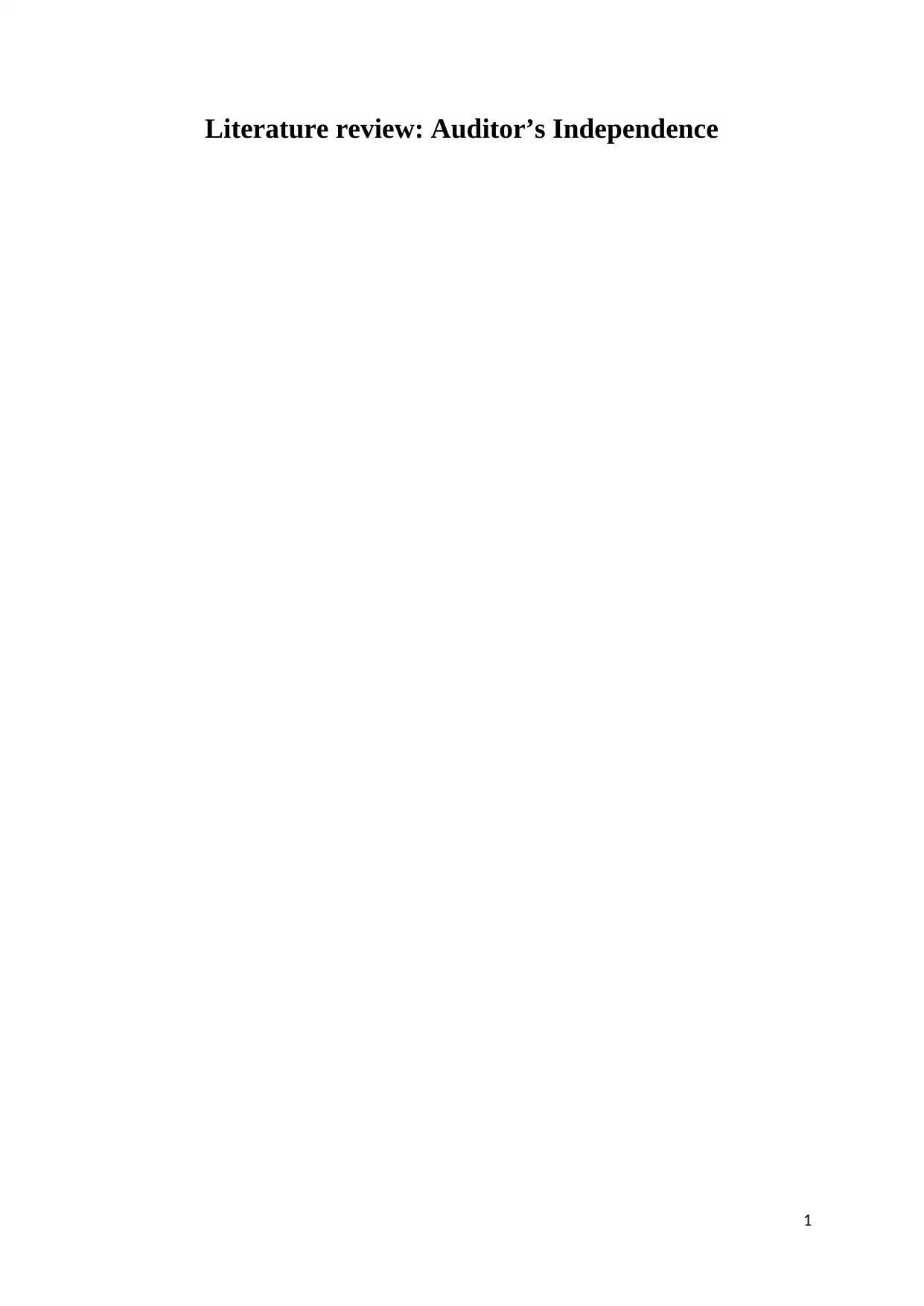
Literature review: Auditor’s Independence
1
1
Secure Best Marks with AI Grader
Need help grading? Try our AI Grader for instant feedback on your assignments.
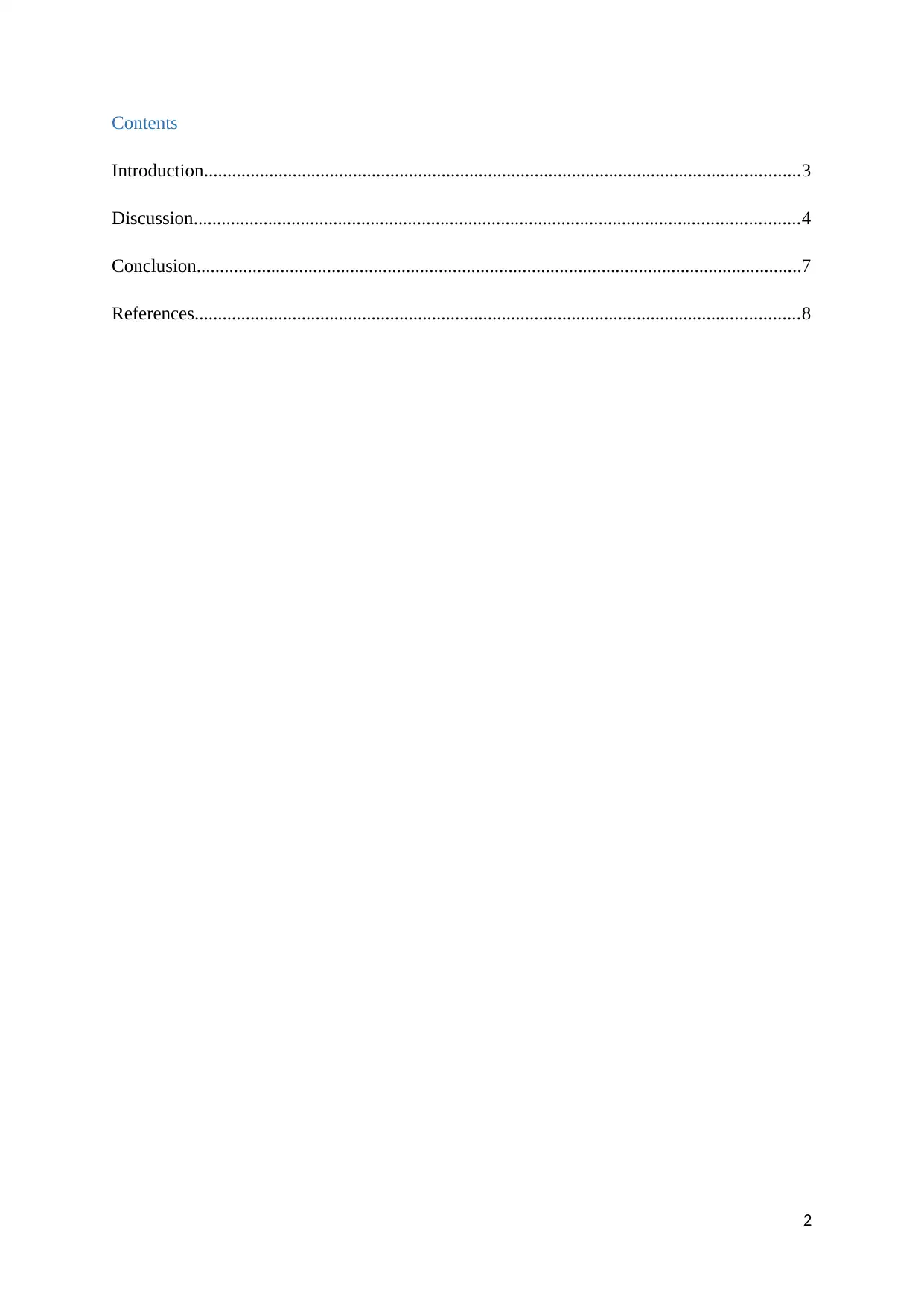
Contents
Introduction................................................................................................................................3
Discussion..................................................................................................................................4
Conclusion..................................................................................................................................7
References..................................................................................................................................8
2
Introduction................................................................................................................................3
Discussion..................................................................................................................................4
Conclusion..................................................................................................................................7
References..................................................................................................................................8
2
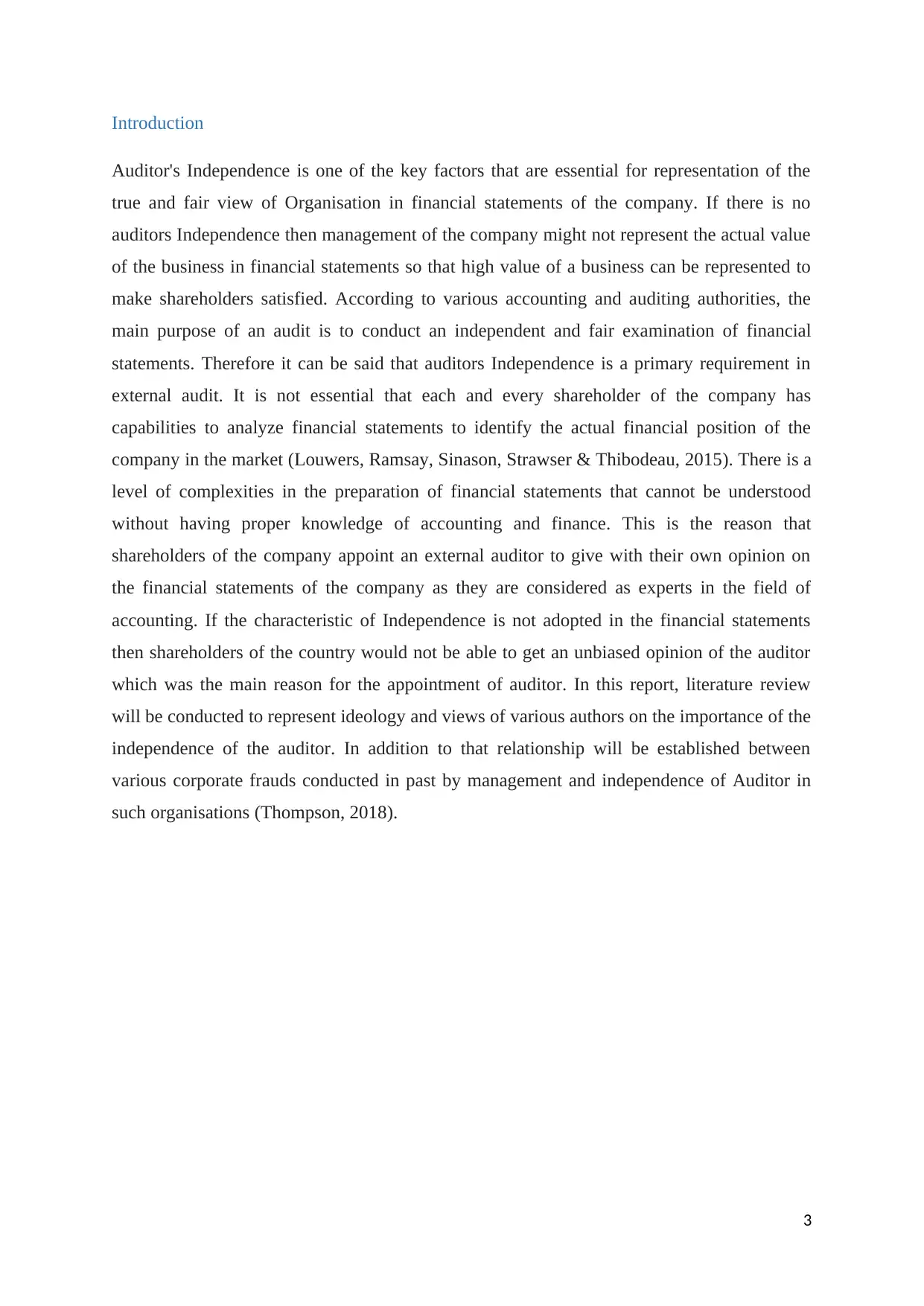
Introduction
Auditor's Independence is one of the key factors that are essential for representation of the
true and fair view of Organisation in financial statements of the company. If there is no
auditors Independence then management of the company might not represent the actual value
of the business in financial statements so that high value of a business can be represented to
make shareholders satisfied. According to various accounting and auditing authorities, the
main purpose of an audit is to conduct an independent and fair examination of financial
statements. Therefore it can be said that auditors Independence is a primary requirement in
external audit. It is not essential that each and every shareholder of the company has
capabilities to analyze financial statements to identify the actual financial position of the
company in the market (Louwers, Ramsay, Sinason, Strawser & Thibodeau, 2015). There is a
level of complexities in the preparation of financial statements that cannot be understood
without having proper knowledge of accounting and finance. This is the reason that
shareholders of the company appoint an external auditor to give with their own opinion on
the financial statements of the company as they are considered as experts in the field of
accounting. If the characteristic of Independence is not adopted in the financial statements
then shareholders of the country would not be able to get an unbiased opinion of the auditor
which was the main reason for the appointment of auditor. In this report, literature review
will be conducted to represent ideology and views of various authors on the importance of the
independence of the auditor. In addition to that relationship will be established between
various corporate frauds conducted in past by management and independence of Auditor in
such organisations (Thompson, 2018).
3
Auditor's Independence is one of the key factors that are essential for representation of the
true and fair view of Organisation in financial statements of the company. If there is no
auditors Independence then management of the company might not represent the actual value
of the business in financial statements so that high value of a business can be represented to
make shareholders satisfied. According to various accounting and auditing authorities, the
main purpose of an audit is to conduct an independent and fair examination of financial
statements. Therefore it can be said that auditors Independence is a primary requirement in
external audit. It is not essential that each and every shareholder of the company has
capabilities to analyze financial statements to identify the actual financial position of the
company in the market (Louwers, Ramsay, Sinason, Strawser & Thibodeau, 2015). There is a
level of complexities in the preparation of financial statements that cannot be understood
without having proper knowledge of accounting and finance. This is the reason that
shareholders of the company appoint an external auditor to give with their own opinion on
the financial statements of the company as they are considered as experts in the field of
accounting. If the characteristic of Independence is not adopted in the financial statements
then shareholders of the country would not be able to get an unbiased opinion of the auditor
which was the main reason for the appointment of auditor. In this report, literature review
will be conducted to represent ideology and views of various authors on the importance of the
independence of the auditor. In addition to that relationship will be established between
various corporate frauds conducted in past by management and independence of Auditor in
such organisations (Thompson, 2018).
3
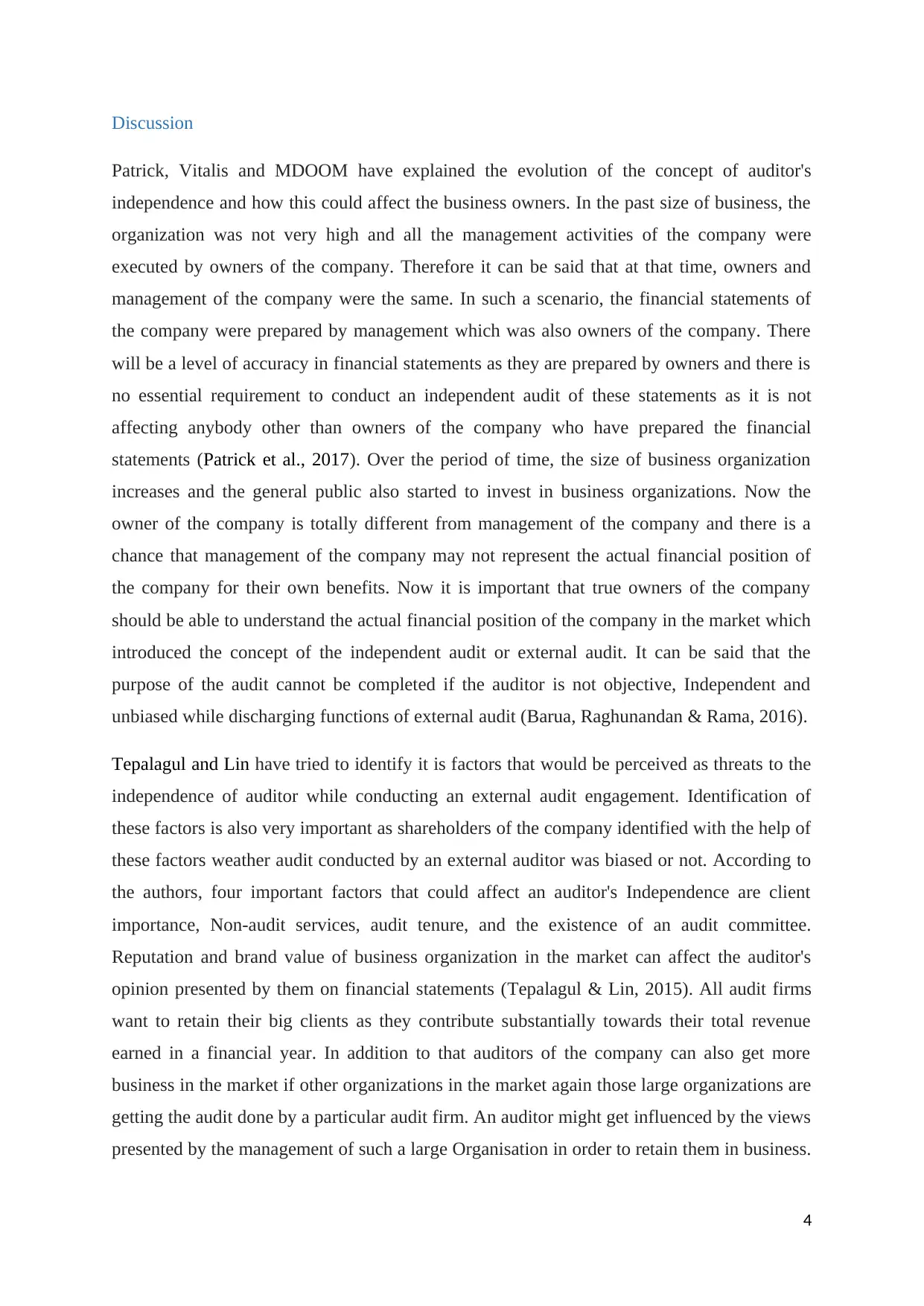
Discussion
Patrick, Vitalis and MDOOM have explained the evolution of the concept of auditor's
independence and how this could affect the business owners. In the past size of business, the
organization was not very high and all the management activities of the company were
executed by owners of the company. Therefore it can be said that at that time, owners and
management of the company were the same. In such a scenario, the financial statements of
the company were prepared by management which was also owners of the company. There
will be a level of accuracy in financial statements as they are prepared by owners and there is
no essential requirement to conduct an independent audit of these statements as it is not
affecting anybody other than owners of the company who have prepared the financial
statements (Patrick et al., 2017). Over the period of time, the size of business organization
increases and the general public also started to invest in business organizations. Now the
owner of the company is totally different from management of the company and there is a
chance that management of the company may not represent the actual financial position of
the company for their own benefits. Now it is important that true owners of the company
should be able to understand the actual financial position of the company in the market which
introduced the concept of the independent audit or external audit. It can be said that the
purpose of the audit cannot be completed if the auditor is not objective, Independent and
unbiased while discharging functions of external audit (Barua, Raghunandan & Rama, 2016).
Tepalagul and Lin have tried to identify it is factors that would be perceived as threats to the
independence of auditor while conducting an external audit engagement. Identification of
these factors is also very important as shareholders of the company identified with the help of
these factors weather audit conducted by an external auditor was biased or not. According to
the authors, four important factors that could affect an auditor's Independence are client
importance, Non-audit services, audit tenure, and the existence of an audit committee.
Reputation and brand value of business organization in the market can affect the auditor's
opinion presented by them on financial statements (Tepalagul & Lin, 2015). All audit firms
want to retain their big clients as they contribute substantially towards their total revenue
earned in a financial year. In addition to that auditors of the company can also get more
business in the market if other organizations in the market again those large organizations are
getting the audit done by a particular audit firm. An auditor might get influenced by the views
presented by the management of such a large Organisation in order to retain them in business.
4
Patrick, Vitalis and MDOOM have explained the evolution of the concept of auditor's
independence and how this could affect the business owners. In the past size of business, the
organization was not very high and all the management activities of the company were
executed by owners of the company. Therefore it can be said that at that time, owners and
management of the company were the same. In such a scenario, the financial statements of
the company were prepared by management which was also owners of the company. There
will be a level of accuracy in financial statements as they are prepared by owners and there is
no essential requirement to conduct an independent audit of these statements as it is not
affecting anybody other than owners of the company who have prepared the financial
statements (Patrick et al., 2017). Over the period of time, the size of business organization
increases and the general public also started to invest in business organizations. Now the
owner of the company is totally different from management of the company and there is a
chance that management of the company may not represent the actual financial position of
the company for their own benefits. Now it is important that true owners of the company
should be able to understand the actual financial position of the company in the market which
introduced the concept of the independent audit or external audit. It can be said that the
purpose of the audit cannot be completed if the auditor is not objective, Independent and
unbiased while discharging functions of external audit (Barua, Raghunandan & Rama, 2016).
Tepalagul and Lin have tried to identify it is factors that would be perceived as threats to the
independence of auditor while conducting an external audit engagement. Identification of
these factors is also very important as shareholders of the company identified with the help of
these factors weather audit conducted by an external auditor was biased or not. According to
the authors, four important factors that could affect an auditor's Independence are client
importance, Non-audit services, audit tenure, and the existence of an audit committee.
Reputation and brand value of business organization in the market can affect the auditor's
opinion presented by them on financial statements (Tepalagul & Lin, 2015). All audit firms
want to retain their big clients as they contribute substantially towards their total revenue
earned in a financial year. In addition to that auditors of the company can also get more
business in the market if other organizations in the market again those large organizations are
getting the audit done by a particular audit firm. An auditor might get influenced by the views
presented by the management of such a large Organisation in order to retain them in business.
4
Secure Best Marks with AI Grader
Need help grading? Try our AI Grader for instant feedback on your assignments.
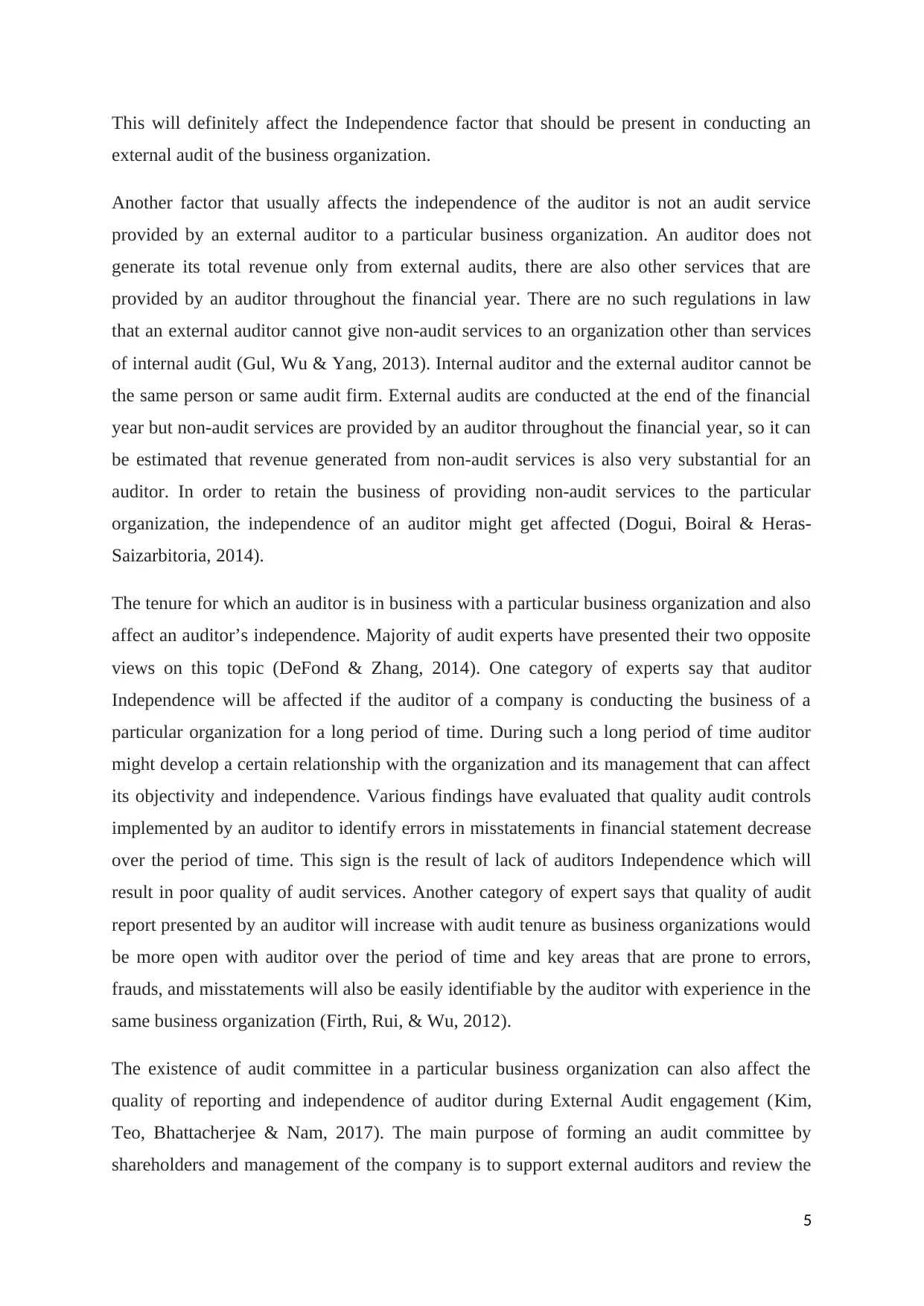
This will definitely affect the Independence factor that should be present in conducting an
external audit of the business organization.
Another factor that usually affects the independence of the auditor is not an audit service
provided by an external auditor to a particular business organization. An auditor does not
generate its total revenue only from external audits, there are also other services that are
provided by an auditor throughout the financial year. There are no such regulations in law
that an external auditor cannot give non-audit services to an organization other than services
of internal audit (Gul, Wu & Yang, 2013). Internal auditor and the external auditor cannot be
the same person or same audit firm. External audits are conducted at the end of the financial
year but non-audit services are provided by an auditor throughout the financial year, so it can
be estimated that revenue generated from non-audit services is also very substantial for an
auditor. In order to retain the business of providing non-audit services to the particular
organization, the independence of an auditor might get affected (Dogui, Boiral & Heras‐
Saizarbitoria, 2014).
The tenure for which an auditor is in business with a particular business organization and also
affect an auditor’s independence. Majority of audit experts have presented their two opposite
views on this topic (DeFond & Zhang, 2014). One category of experts say that auditor
Independence will be affected if the auditor of a company is conducting the business of a
particular organization for a long period of time. During such a long period of time auditor
might develop a certain relationship with the organization and its management that can affect
its objectivity and independence. Various findings have evaluated that quality audit controls
implemented by an auditor to identify errors in misstatements in financial statement decrease
over the period of time. This sign is the result of lack of auditors Independence which will
result in poor quality of audit services. Another category of expert says that quality of audit
report presented by an auditor will increase with audit tenure as business organizations would
be more open with auditor over the period of time and key areas that are prone to errors,
frauds, and misstatements will also be easily identifiable by the auditor with experience in the
same business organization (Firth, Rui, & Wu, 2012).
The existence of audit committee in a particular business organization can also affect the
quality of reporting and independence of auditor during External Audit engagement (Kim,
Teo, Bhattacherjee & Nam, 2017). The main purpose of forming an audit committee by
shareholders and management of the company is to support external auditors and review the
5
external audit of the business organization.
Another factor that usually affects the independence of the auditor is not an audit service
provided by an external auditor to a particular business organization. An auditor does not
generate its total revenue only from external audits, there are also other services that are
provided by an auditor throughout the financial year. There are no such regulations in law
that an external auditor cannot give non-audit services to an organization other than services
of internal audit (Gul, Wu & Yang, 2013). Internal auditor and the external auditor cannot be
the same person or same audit firm. External audits are conducted at the end of the financial
year but non-audit services are provided by an auditor throughout the financial year, so it can
be estimated that revenue generated from non-audit services is also very substantial for an
auditor. In order to retain the business of providing non-audit services to the particular
organization, the independence of an auditor might get affected (Dogui, Boiral & Heras‐
Saizarbitoria, 2014).
The tenure for which an auditor is in business with a particular business organization and also
affect an auditor’s independence. Majority of audit experts have presented their two opposite
views on this topic (DeFond & Zhang, 2014). One category of experts say that auditor
Independence will be affected if the auditor of a company is conducting the business of a
particular organization for a long period of time. During such a long period of time auditor
might develop a certain relationship with the organization and its management that can affect
its objectivity and independence. Various findings have evaluated that quality audit controls
implemented by an auditor to identify errors in misstatements in financial statement decrease
over the period of time. This sign is the result of lack of auditors Independence which will
result in poor quality of audit services. Another category of expert says that quality of audit
report presented by an auditor will increase with audit tenure as business organizations would
be more open with auditor over the period of time and key areas that are prone to errors,
frauds, and misstatements will also be easily identifiable by the auditor with experience in the
same business organization (Firth, Rui, & Wu, 2012).
The existence of audit committee in a particular business organization can also affect the
quality of reporting and independence of auditor during External Audit engagement (Kim,
Teo, Bhattacherjee & Nam, 2017). The main purpose of forming an audit committee by
shareholders and management of the company is to support external auditors and review the
5
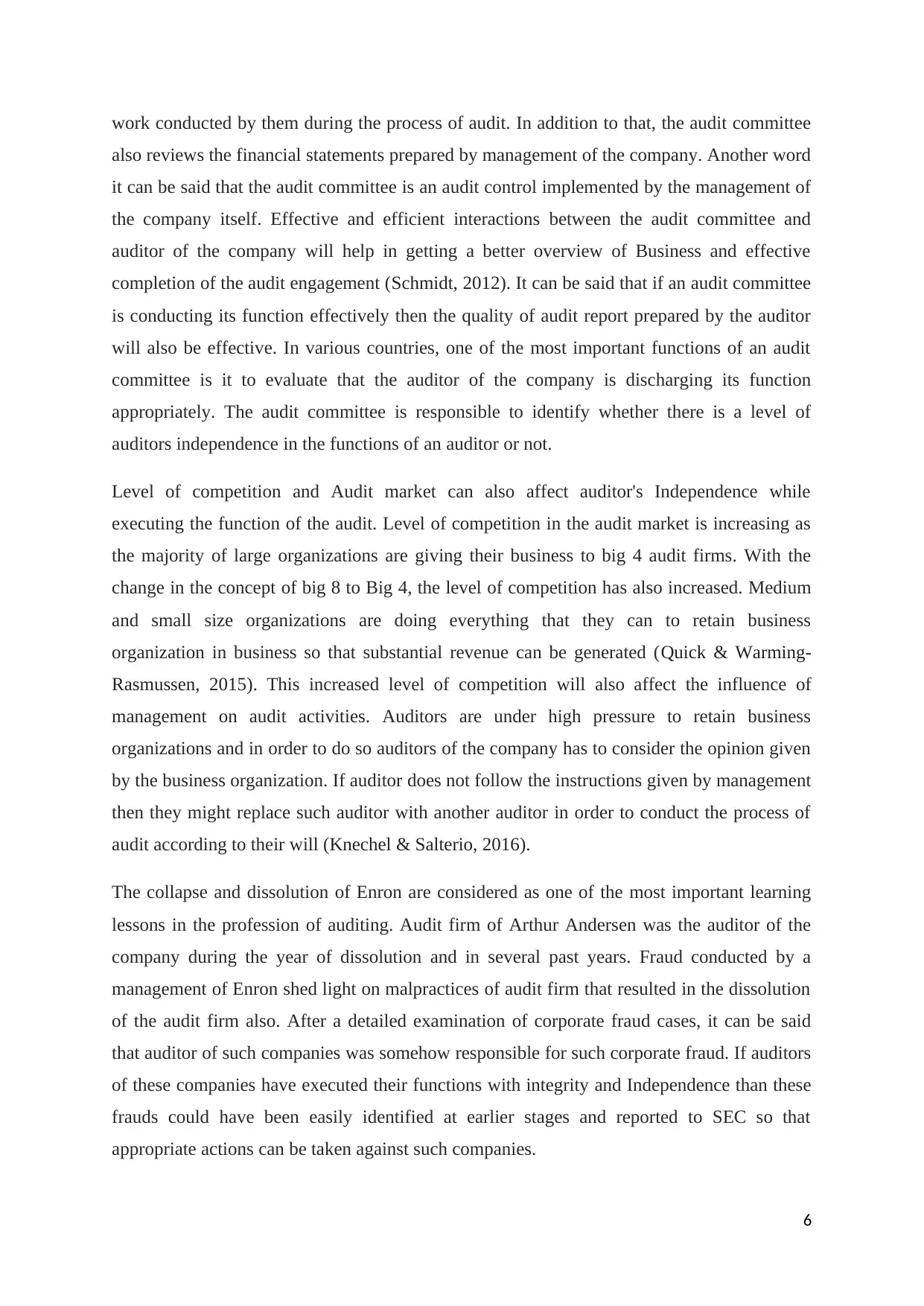
work conducted by them during the process of audit. In addition to that, the audit committee
also reviews the financial statements prepared by management of the company. Another word
it can be said that the audit committee is an audit control implemented by the management of
the company itself. Effective and efficient interactions between the audit committee and
auditor of the company will help in getting a better overview of Business and effective
completion of the audit engagement (Schmidt, 2012). It can be said that if an audit committee
is conducting its function effectively then the quality of audit report prepared by the auditor
will also be effective. In various countries, one of the most important functions of an audit
committee is it to evaluate that the auditor of the company is discharging its function
appropriately. The audit committee is responsible to identify whether there is a level of
auditors independence in the functions of an auditor or not.
Level of competition and Audit market can also affect auditor's Independence while
executing the function of the audit. Level of competition in the audit market is increasing as
the majority of large organizations are giving their business to big 4 audit firms. With the
change in the concept of big 8 to Big 4, the level of competition has also increased. Medium
and small size organizations are doing everything that they can to retain business
organization in business so that substantial revenue can be generated (Quick & Warming‐
Rasmussen, 2015). This increased level of competition will also affect the influence of
management on audit activities. Auditors are under high pressure to retain business
organizations and in order to do so auditors of the company has to consider the opinion given
by the business organization. If auditor does not follow the instructions given by management
then they might replace such auditor with another auditor in order to conduct the process of
audit according to their will (Knechel & Salterio, 2016).
The collapse and dissolution of Enron are considered as one of the most important learning
lessons in the profession of auditing. Audit firm of Arthur Andersen was the auditor of the
company during the year of dissolution and in several past years. Fraud conducted by a
management of Enron shed light on malpractices of audit firm that resulted in the dissolution
of the audit firm also. After a detailed examination of corporate fraud cases, it can be said
that auditor of such companies was somehow responsible for such corporate fraud. If auditors
of these companies have executed their functions with integrity and Independence than these
frauds could have been easily identified at earlier stages and reported to SEC so that
appropriate actions can be taken against such companies.
6
also reviews the financial statements prepared by management of the company. Another word
it can be said that the audit committee is an audit control implemented by the management of
the company itself. Effective and efficient interactions between the audit committee and
auditor of the company will help in getting a better overview of Business and effective
completion of the audit engagement (Schmidt, 2012). It can be said that if an audit committee
is conducting its function effectively then the quality of audit report prepared by the auditor
will also be effective. In various countries, one of the most important functions of an audit
committee is it to evaluate that the auditor of the company is discharging its function
appropriately. The audit committee is responsible to identify whether there is a level of
auditors independence in the functions of an auditor or not.
Level of competition and Audit market can also affect auditor's Independence while
executing the function of the audit. Level of competition in the audit market is increasing as
the majority of large organizations are giving their business to big 4 audit firms. With the
change in the concept of big 8 to Big 4, the level of competition has also increased. Medium
and small size organizations are doing everything that they can to retain business
organization in business so that substantial revenue can be generated (Quick & Warming‐
Rasmussen, 2015). This increased level of competition will also affect the influence of
management on audit activities. Auditors are under high pressure to retain business
organizations and in order to do so auditors of the company has to consider the opinion given
by the business organization. If auditor does not follow the instructions given by management
then they might replace such auditor with another auditor in order to conduct the process of
audit according to their will (Knechel & Salterio, 2016).
The collapse and dissolution of Enron are considered as one of the most important learning
lessons in the profession of auditing. Audit firm of Arthur Andersen was the auditor of the
company during the year of dissolution and in several past years. Fraud conducted by a
management of Enron shed light on malpractices of audit firm that resulted in the dissolution
of the audit firm also. After a detailed examination of corporate fraud cases, it can be said
that auditor of such companies was somehow responsible for such corporate fraud. If auditors
of these companies have executed their functions with integrity and Independence than these
frauds could have been easily identified at earlier stages and reported to SEC so that
appropriate actions can be taken against such companies.
6
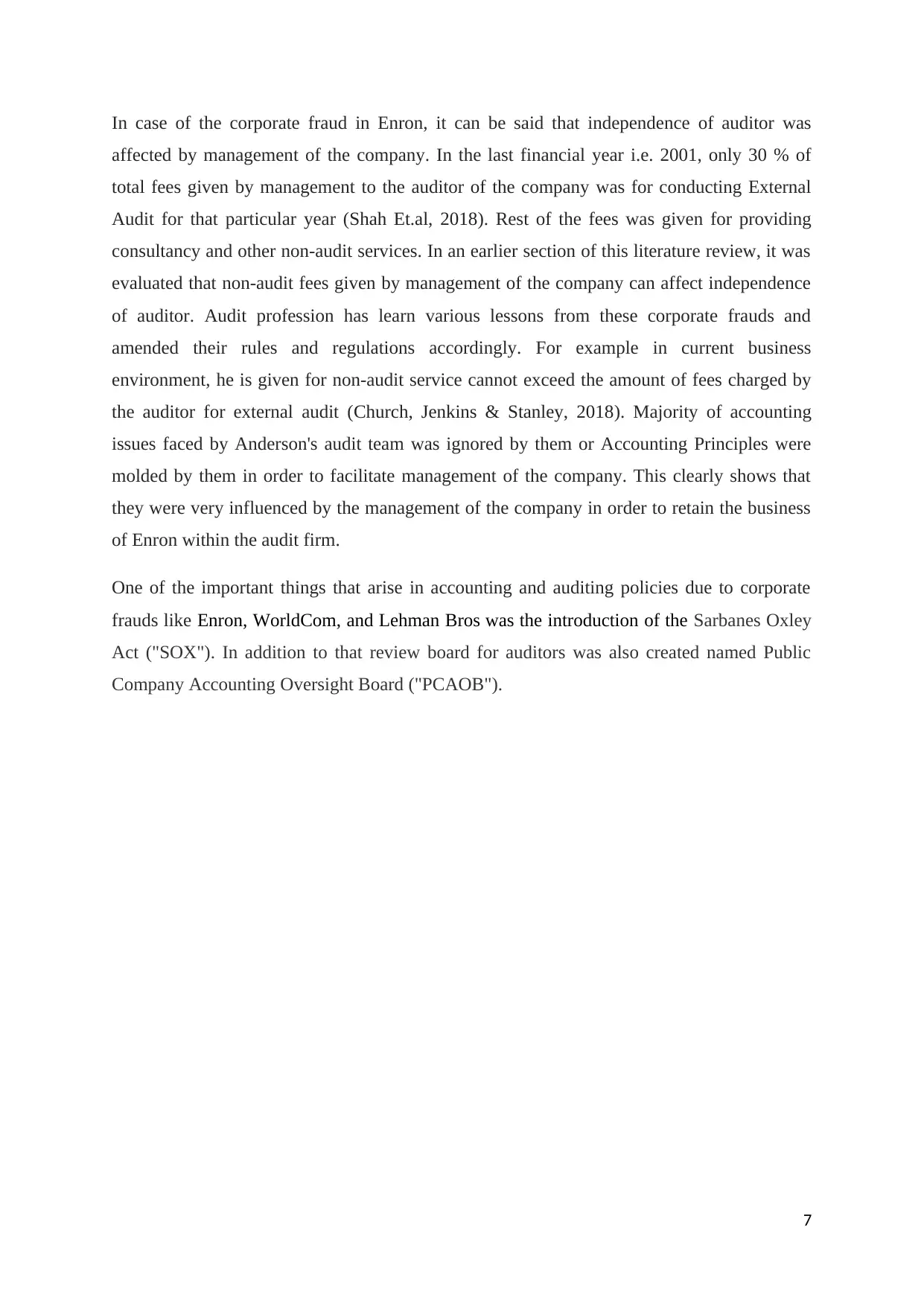
In case of the corporate fraud in Enron, it can be said that independence of auditor was
affected by management of the company. In the last financial year i.e. 2001, only 30 % of
total fees given by management to the auditor of the company was for conducting External
Audit for that particular year (Shah Et.al, 2018). Rest of the fees was given for providing
consultancy and other non-audit services. In an earlier section of this literature review, it was
evaluated that non-audit fees given by management of the company can affect independence
of auditor. Audit profession has learn various lessons from these corporate frauds and
amended their rules and regulations accordingly. For example in current business
environment, he is given for non-audit service cannot exceed the amount of fees charged by
the auditor for external audit (Church, Jenkins & Stanley, 2018). Majority of accounting
issues faced by Anderson's audit team was ignored by them or Accounting Principles were
molded by them in order to facilitate management of the company. This clearly shows that
they were very influenced by the management of the company in order to retain the business
of Enron within the audit firm.
One of the important things that arise in accounting and auditing policies due to corporate
frauds like Enron, WorldCom, and Lehman Bros was the introduction of the Sarbanes Oxley
Act ("SOX"). In addition to that review board for auditors was also created named Public
Company Accounting Oversight Board ("PCAOB").
7
affected by management of the company. In the last financial year i.e. 2001, only 30 % of
total fees given by management to the auditor of the company was for conducting External
Audit for that particular year (Shah Et.al, 2018). Rest of the fees was given for providing
consultancy and other non-audit services. In an earlier section of this literature review, it was
evaluated that non-audit fees given by management of the company can affect independence
of auditor. Audit profession has learn various lessons from these corporate frauds and
amended their rules and regulations accordingly. For example in current business
environment, he is given for non-audit service cannot exceed the amount of fees charged by
the auditor for external audit (Church, Jenkins & Stanley, 2018). Majority of accounting
issues faced by Anderson's audit team was ignored by them or Accounting Principles were
molded by them in order to facilitate management of the company. This clearly shows that
they were very influenced by the management of the company in order to retain the business
of Enron within the audit firm.
One of the important things that arise in accounting and auditing policies due to corporate
frauds like Enron, WorldCom, and Lehman Bros was the introduction of the Sarbanes Oxley
Act ("SOX"). In addition to that review board for auditors was also created named Public
Company Accounting Oversight Board ("PCAOB").
7
Paraphrase This Document
Need a fresh take? Get an instant paraphrase of this document with our AI Paraphraser
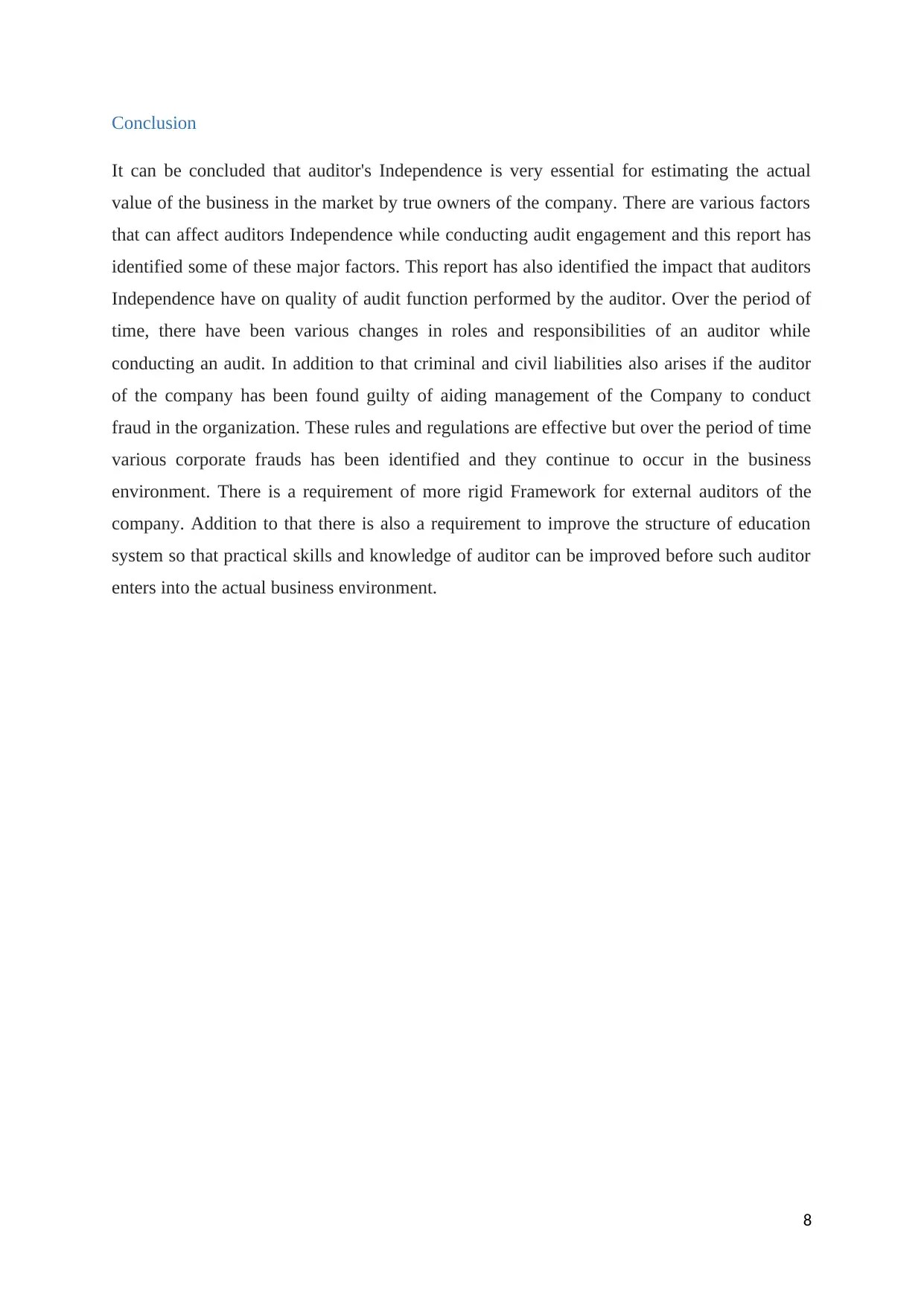
Conclusion
It can be concluded that auditor's Independence is very essential for estimating the actual
value of the business in the market by true owners of the company. There are various factors
that can affect auditors Independence while conducting audit engagement and this report has
identified some of these major factors. This report has also identified the impact that auditors
Independence have on quality of audit function performed by the auditor. Over the period of
time, there have been various changes in roles and responsibilities of an auditor while
conducting an audit. In addition to that criminal and civil liabilities also arises if the auditor
of the company has been found guilty of aiding management of the Company to conduct
fraud in the organization. These rules and regulations are effective but over the period of time
various corporate frauds has been identified and they continue to occur in the business
environment. There is a requirement of more rigid Framework for external auditors of the
company. Addition to that there is also a requirement to improve the structure of education
system so that practical skills and knowledge of auditor can be improved before such auditor
enters into the actual business environment.
8
It can be concluded that auditor's Independence is very essential for estimating the actual
value of the business in the market by true owners of the company. There are various factors
that can affect auditors Independence while conducting audit engagement and this report has
identified some of these major factors. This report has also identified the impact that auditors
Independence have on quality of audit function performed by the auditor. Over the period of
time, there have been various changes in roles and responsibilities of an auditor while
conducting an audit. In addition to that criminal and civil liabilities also arises if the auditor
of the company has been found guilty of aiding management of the Company to conduct
fraud in the organization. These rules and regulations are effective but over the period of time
various corporate frauds has been identified and they continue to occur in the business
environment. There is a requirement of more rigid Framework for external auditors of the
company. Addition to that there is also a requirement to improve the structure of education
system so that practical skills and knowledge of auditor can be improved before such auditor
enters into the actual business environment.
8
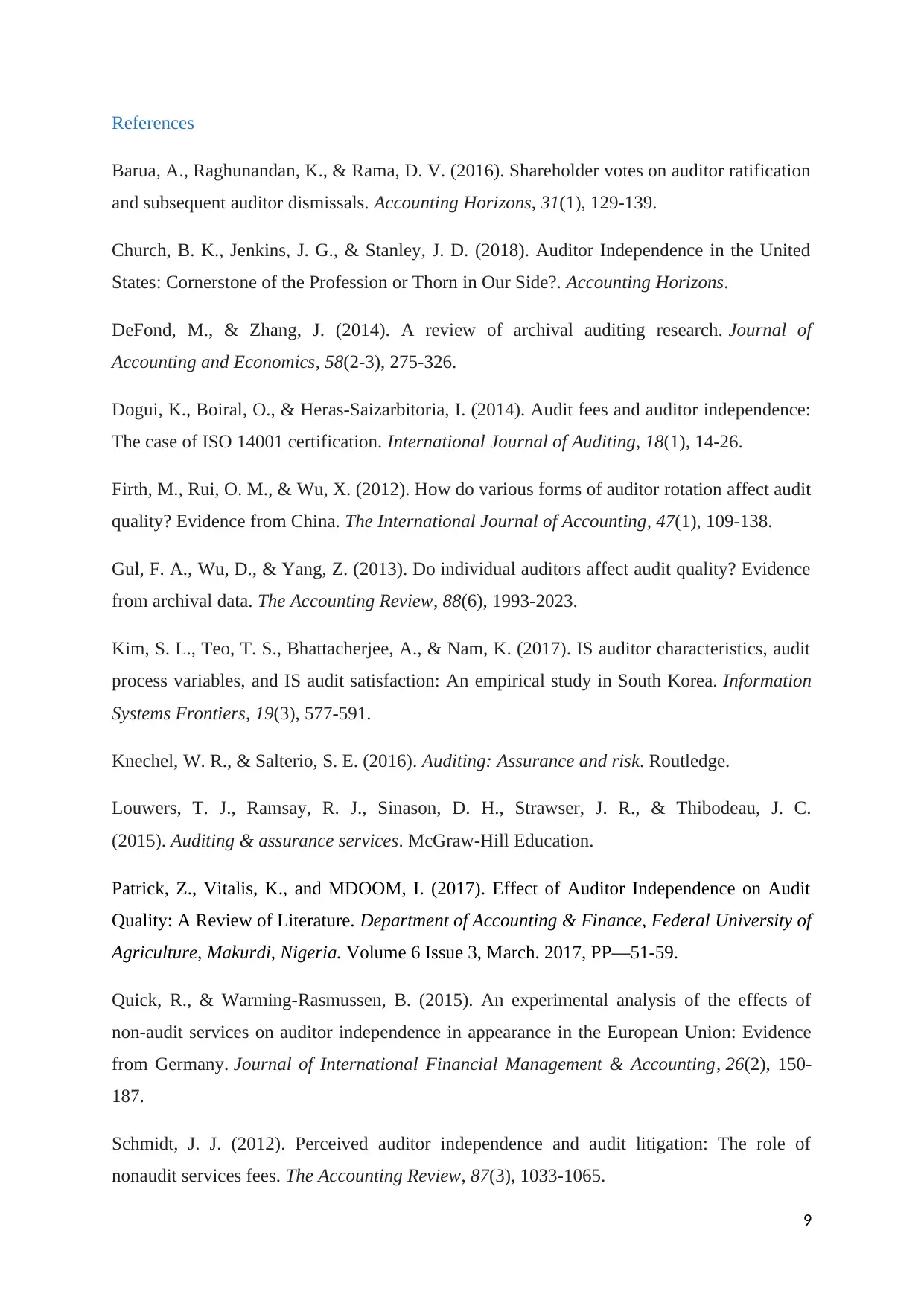
References
Barua, A., Raghunandan, K., & Rama, D. V. (2016). Shareholder votes on auditor ratification
and subsequent auditor dismissals. Accounting Horizons, 31(1), 129-139.
Church, B. K., Jenkins, J. G., & Stanley, J. D. (2018). Auditor Independence in the United
States: Cornerstone of the Profession or Thorn in Our Side?. Accounting Horizons.
DeFond, M., & Zhang, J. (2014). A review of archival auditing research. Journal of
Accounting and Economics, 58(2-3), 275-326.
Dogui, K., Boiral, O., & Heras‐Saizarbitoria, I. (2014). Audit fees and auditor independence:
The case of ISO 14001 certification. International Journal of Auditing, 18(1), 14-26.
Firth, M., Rui, O. M., & Wu, X. (2012). How do various forms of auditor rotation affect audit
quality? Evidence from China. The International Journal of Accounting, 47(1), 109-138.
Gul, F. A., Wu, D., & Yang, Z. (2013). Do individual auditors affect audit quality? Evidence
from archival data. The Accounting Review, 88(6), 1993-2023.
Kim, S. L., Teo, T. S., Bhattacherjee, A., & Nam, K. (2017). IS auditor characteristics, audit
process variables, and IS audit satisfaction: An empirical study in South Korea. Information
Systems Frontiers, 19(3), 577-591.
Knechel, W. R., & Salterio, S. E. (2016). Auditing: Assurance and risk. Routledge.
Louwers, T. J., Ramsay, R. J., Sinason, D. H., Strawser, J. R., & Thibodeau, J. C.
(2015). Auditing & assurance services. McGraw-Hill Education.
Patrick, Z., Vitalis, K., and MDOOM, I. (2017). Effect of Auditor Independence on Audit
Quality: A Review of Literature. Department of Accounting & Finance, Federal University of
Agriculture, Makurdi, Nigeria. Volume 6 Issue 3, March. 2017, PP—51-59.
Quick, R., & Warming‐Rasmussen, B. (2015). An experimental analysis of the effects of
non‐audit services on auditor independence in appearance in the European Union: Evidence
from Germany. Journal of International Financial Management & Accounting, 26(2), 150-
187.
Schmidt, J. J. (2012). Perceived auditor independence and audit litigation: The role of
nonaudit services fees. The Accounting Review, 87(3), 1033-1065.
9
Barua, A., Raghunandan, K., & Rama, D. V. (2016). Shareholder votes on auditor ratification
and subsequent auditor dismissals. Accounting Horizons, 31(1), 129-139.
Church, B. K., Jenkins, J. G., & Stanley, J. D. (2018). Auditor Independence in the United
States: Cornerstone of the Profession or Thorn in Our Side?. Accounting Horizons.
DeFond, M., & Zhang, J. (2014). A review of archival auditing research. Journal of
Accounting and Economics, 58(2-3), 275-326.
Dogui, K., Boiral, O., & Heras‐Saizarbitoria, I. (2014). Audit fees and auditor independence:
The case of ISO 14001 certification. International Journal of Auditing, 18(1), 14-26.
Firth, M., Rui, O. M., & Wu, X. (2012). How do various forms of auditor rotation affect audit
quality? Evidence from China. The International Journal of Accounting, 47(1), 109-138.
Gul, F. A., Wu, D., & Yang, Z. (2013). Do individual auditors affect audit quality? Evidence
from archival data. The Accounting Review, 88(6), 1993-2023.
Kim, S. L., Teo, T. S., Bhattacherjee, A., & Nam, K. (2017). IS auditor characteristics, audit
process variables, and IS audit satisfaction: An empirical study in South Korea. Information
Systems Frontiers, 19(3), 577-591.
Knechel, W. R., & Salterio, S. E. (2016). Auditing: Assurance and risk. Routledge.
Louwers, T. J., Ramsay, R. J., Sinason, D. H., Strawser, J. R., & Thibodeau, J. C.
(2015). Auditing & assurance services. McGraw-Hill Education.
Patrick, Z., Vitalis, K., and MDOOM, I. (2017). Effect of Auditor Independence on Audit
Quality: A Review of Literature. Department of Accounting & Finance, Federal University of
Agriculture, Makurdi, Nigeria. Volume 6 Issue 3, March. 2017, PP—51-59.
Quick, R., & Warming‐Rasmussen, B. (2015). An experimental analysis of the effects of
non‐audit services on auditor independence in appearance in the European Union: Evidence
from Germany. Journal of International Financial Management & Accounting, 26(2), 150-
187.
Schmidt, J. J. (2012). Perceived auditor independence and audit litigation: The role of
nonaudit services fees. The Accounting Review, 87(3), 1033-1065.
9
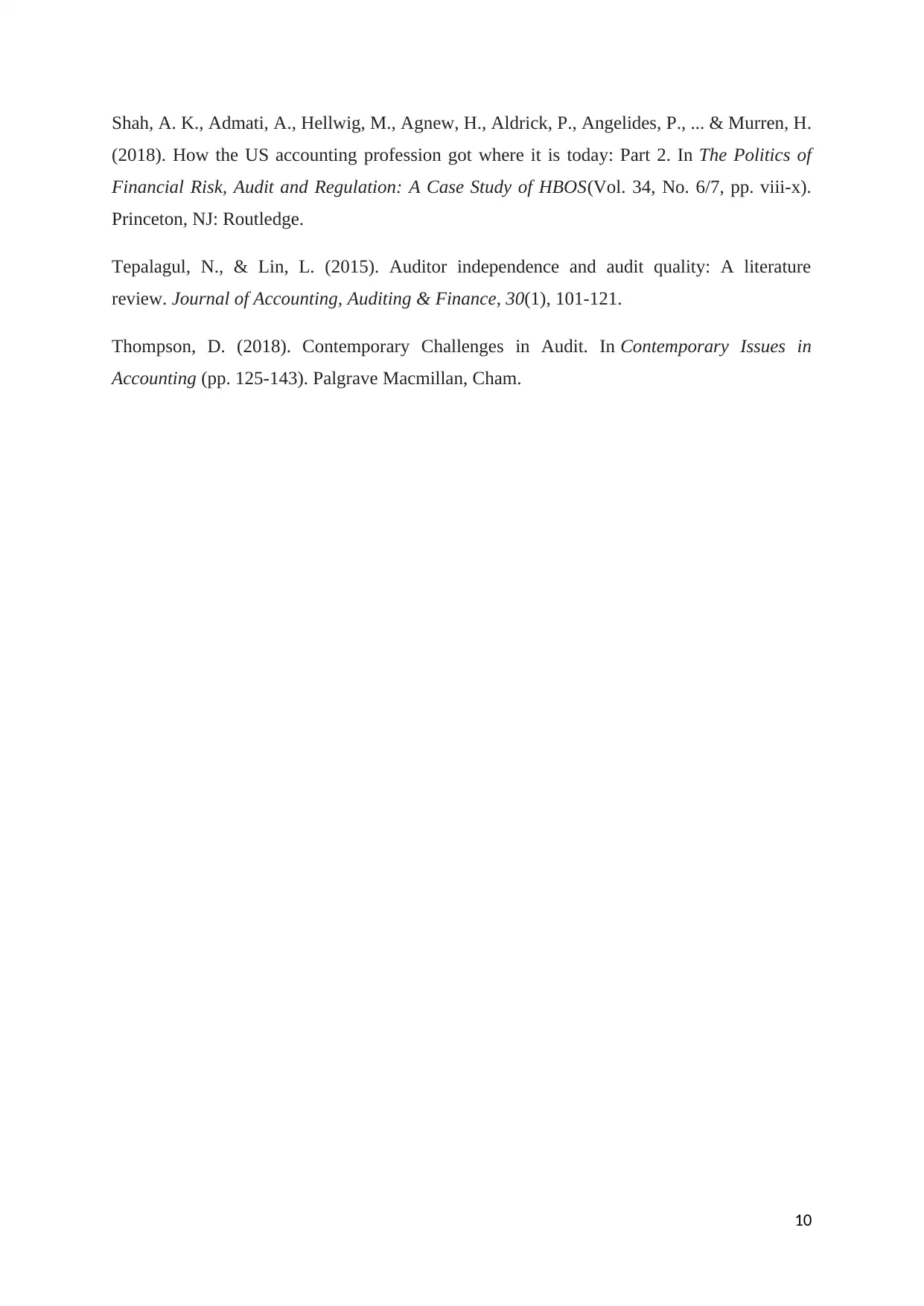
Shah, A. K., Admati, A., Hellwig, M., Agnew, H., Aldrick, P., Angelides, P., ... & Murren, H.
(2018). How the US accounting profession got where it is today: Part 2. In The Politics of
Financial Risk, Audit and Regulation: A Case Study of HBOS(Vol. 34, No. 6/7, pp. viii-x).
Princeton, NJ: Routledge.
Tepalagul, N., & Lin, L. (2015). Auditor independence and audit quality: A literature
review. Journal of Accounting, Auditing & Finance, 30(1), 101-121.
Thompson, D. (2018). Contemporary Challenges in Audit. In Contemporary Issues in
Accounting (pp. 125-143). Palgrave Macmillan, Cham.
10
(2018). How the US accounting profession got where it is today: Part 2. In The Politics of
Financial Risk, Audit and Regulation: A Case Study of HBOS(Vol. 34, No. 6/7, pp. viii-x).
Princeton, NJ: Routledge.
Tepalagul, N., & Lin, L. (2015). Auditor independence and audit quality: A literature
review. Journal of Accounting, Auditing & Finance, 30(1), 101-121.
Thompson, D. (2018). Contemporary Challenges in Audit. In Contemporary Issues in
Accounting (pp. 125-143). Palgrave Macmillan, Cham.
10
1 out of 10
Related Documents
Your All-in-One AI-Powered Toolkit for Academic Success.
+13062052269
info@desklib.com
Available 24*7 on WhatsApp / Email
![[object Object]](/_next/static/media/star-bottom.7253800d.svg)
Unlock your academic potential
© 2024 | Zucol Services PVT LTD | All rights reserved.





